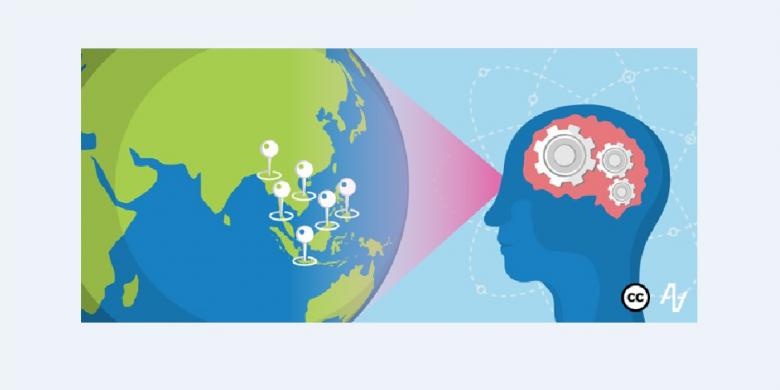
A discussion with historian Derek Penslar about why their valor has been forgotten, even though it made the Jewish state possible
By Samuel Moyn

Posters in English and Yiddish, produced in Montreal during the World War I, show a soldier cutting the bonds from a Jewish man, who strains to join a group of soldiers running in the distance and says, “You have cut my bonds and set me free – now let me help you set others free!” Above are portraits of Rt. Hon. Herbert Samuel, Viscount Reading, and Rt. Hon. Edwin S. Montagu, all Jewish members of the British Parliament. (Library of Congress)
The historian Derek J. Penslar starts his masterful new book, Jews and the Military: A History, with an anecdote. He gave a lecture about Jewish soldiers at a synagogue in Toronto, in the presence of many who had seen fighting in World War II and the Korean War—conflicts that were some the most vicious imaginable. But it was another man, who announced that he had served in the Harel Brigade in Israel’s 1948 War of Independence, who received all the applause.
The episode, Penslar writes, stuck with him as an illustration of how “fierce pride” in Israel’s tradition of wartime success, however understandable, “casts a shadow over the millions of Jews who throughout modern times have served, as conscripts or volunteers, in the armed forces of their homelands.” As a result, he argues, the service of millions of Jews in the armies of the states of the West since the French Revolution is a dramatic story that has never been told in its entirety—in part because the collective memory of Jewish valor in the Diaspora almost been blotted out by the success of Israel’s self-defense, despite the fact that it paved the way for Israel’s fighting prowess.
Penslar reconstructs the story with an impressive blend of broad synthesis and targeted investigation. Most of the familiar elements of the story of modern Jewry, including emancipation, “assimilation,” achievement, persecution, genocide, and statehood, are there but look different thanks to Penslar’s novel angle on them. We are used to stories of the great social success that the emancipation process from 1789 on allowed in spheres like business, science, and the arts, but Penslar remedies our forgetfulness of the military as another sphere—and one of great importance—in which Jewish citizenship often meant national military service, at least for men. The modern state was long defined by its capacity to wage war, and Jews were emancipated into this aspect of citizenship too; indeed, the point of Jewish service was to prove that Jews were full members of the modern states where they made their homes.
One of Penslar’s key arguments is that, in the era of the 20th century’s world wars, the Zionist movement drew on the Diaspora tradition of serving the great powers, now in hopes of stimulating their diplomatic investment in a Jewish state. Penslar cites the Jewish Legion of World War I, founded after Vladimir Jabotinsky and Joseph Trumpeldor lobbied the British government to let Jewish volunteers participate in the liberation of Palestine from Ottoman rule, as proof of his point. If Jewish victimhood commonly justifies the state of Israel, Penslar shows that Diaspora traditions of Jewish warfare contributed to making it a controversial reality.
I invited Professor Penslar, who has taught for many years at the University of Toronto and recently assumed a new appointment at the University of Oxford, to discuss the importance of recovering this crucial aspect of Jewish history.
How did you come to write this book?
About 10 years ago an old college friend and I were chatting about what I might write about next, and he said he was intrigued by the moral dilemmas faced by Jews in modern armies who for the first time faced the prospect of fighting other Jews in the enemy army. This idea resonated with me, and it eventually became the subject of one of this book’s chapters.
There is a back story, though. Since graduate school I’ve been thinking about Jewish history in the context of the modern state and the tensions between Jewish solidarity, on the one hand, and acculturation and state patriotism, on the other. I like thinking about how the environment in which Jews live has influenced how they ran their communities and, eventually, the Zionist movement and state of Israel.
My books have in one way or another been about the relationship between Jews and state power. My first book was about the origins of Zionism’s technocratic elite, which was less visible than the political-military elite but still tremendously influential. I wrote another book about modern Jewish economic life that showed how important financial success was as a justification for Jewish emancipation and a source of power in the form of philanthropy. When my friend made his suggestion I realized that in my work I had always avoided dealing with the most blatant and destructive form of power, that of armed force. And so I decided to write this book.
Your discussion of power reminds me of David Biale’s 1986 classic Power and Powerlessness in Jewish History, which covers two millennia of Jewish attitudes to force but gives service in modern armies short shrift.
I read Biale’s book when I was in graduate school, and it’s been enormously influential. Biale presents Jews as subjects as well as objects, as wielders of power and not only its victims. By focusing on Jews as soldiers, I’m showing how deeply they were integrated into the modern state and how under certain circumstances Jews could exult in battle, conquest, and empire. This level of identification with the state was found mainly in Western Europe; in the Russian Empire, Jews saw the army much more as a curse, though even there most of them served honorably.
For me one of the most interesting features of the book is how the geography starts with Jewish emancipation into particular European states or empires and ends with perspectives on Jews and arms requiring transnational, international, or even global frames. How does the idea of military service as a dimension of state citizenship affect how we should think about the story of Jewish emancipation?
The modern idea of citizenship was inseparable from military service. One of the major issues in debates about Jewish emancipation in the late 1700s through the mid-1800s was whether Jews would be willing to fight and die for their countries. In Prussia in the 1840s, the government was inclined to bar Jews from the military in order to justify not emancipating them, but Jewish leaders urged the government to draft them, precisely so their rights could not be denied to them.
Also, we can’t separate Jewish emancipation from 19th-century concepts of masculinity. Women were not conscripted and were not thought to be political and social equals. Jewish community leaders and simple soldiers alike were proud that military service would give them the chance to prove the Jews’ valor, which was a key component of male patriotism.
One of the most interesting dimensions of your book is the story of Jewish officers and their fame as exemplars in the Jewish world and beyond. You offer a novel reinterpretation of Alfred Dreyfus and the larger story of Jews in the French army, but apparently renowned Italian officers also came in for attention. And of course, there were Americans too—like Adm. Hyman Rickover, whom I recall my family talking about with great admiration.
Let’s not forget that the Dreyfus Affair, which unleashed torrents of anti-Semitic vitriol, was only made possible because the French state allowed Jews to become army officers. During the period of the Third Republic, there were 20 Jewish generals, and in 1895—the year Dreyfus was falsely convicted of treason and sent to Devil’s Island—there were 350 Jewish officers, 70 of them above the rank of captain. That might not sound like many, but given the small size of the Jewish population of France, Jews were overrepresented in the officer corps at least fourfold. Jewish officers were all over the French Empire—commanding gunboats in the North Atlantic, supervising fortifications in Algeria, marking the border between Indochina and Siam.
How did this happen? Although it had many anti-Semitic officers, the French army was officially meritocratic. Jews from poor backgrounds, the sons of rabbis and kosher butchers, were given full scholarships to the École Polytechnique, which produced artillery and engineering officers. Dreyfus’ story is tragic, but it was not typical. More representative would be that of Col. Émile Mayer, an artillery officer who persevered in the face of anti-Semitism and became a distinguished military theorist and a mentor to the young Charles de Gaulle.
In spite of Jewish loyalty to the nation and service to the modern state—which included funding wars, as you point out—you also emphasize Jewish cosmopolitanism. As the book reaches the 20th century, Jews found themselves on both sides of the world wars, but there is even more to your story. Like many recent historians, you have highlighted that Jews came to see themselves in modern times as an international political entity. How did Jews manage their multiple identifications in the 20th century?
This gets us back to my friend’s question that turned me to this project in the first place. As early as the French revolutionary wars, Jews proclaimed that the ultimate proof of their patriotism was their willingness to face other Jews in the field of battle. Jews continued to sound this note throughout the 1800s, and in World War I, Jews simultaneously declared their willingness to die for their countries and celebrated the heroism of Jews fighting for the other side. After the war, Jewish veterans formed national associations that came together for vast gatherings, which formed a transnational community of combat. At the international association of Jewish war veterans groups in 1935, held in the shadow of Nazi persecution of Germany’s Jews, the veterans honored the 12,000 German-Jewish soldiers killed in the war, and they were addressed by none other than Alfred Dreyfus, who died shortly thereafter.
Your book concludes with a treatment of 1948 as a “Jewish world war.” What do you mean? And how did the creation of the state of Israel then both confirm some of the trends your history lays out and lead people to forget how central the military has been for Jews in the Diaspora in modern times?
Israel could not have won the war without assistance from Diaspora Jewry. Almost 90 percent of the costs of weapons purchased by Israel in 1948 were provided by foreign, mostly Jewish, donations. Foreign volunteers known as Machal numbered only about 3500, but they comprised most of Israel’s infant air force. The Machal also included ground commanders, the most famous of whom was Mickey Marcus, who headed the Jerusalem front. But there were others, including the Canadian Maj. Benjamin Dunkelman, who commanded the 7th Brigade in the lower Galilee. And the ranks of the IDF were augmented by tens of thousands of new arrivals from Eastern Europe, some of whom had done military service before the war. So, in 1948 the line between an “Israeli” and a “Diaspora Jew” was a porous one.
In the years after Israel’s creation, the transnational nature of the 1948 war—and the general story of Jews as soldiers in modern armies—was forgotten. The Holocaust, so it seemed, demonstrated the futility of Jewish devotion to states that betrayed them. As anti-Semitism ebbed, American Jews felt less compelled to publicize their contributions to the nation. In an act of psychic displacement Israel became the focus of Jewish military pride, the epitome of Jewish valor and virility. Instead of commemorating the defense of states in the Diaspora, Jews celebrated Israel’s ability and determination to defend itself. In my book, however, I try to show that Israel’s military ethos is the product of not only the country’s geopolitical situation but also a long heritage of Jewish engagement with military affairs.
Samuel Moyn is James Bryce Professor of European Legal History at Columbia University. His forthcoming book in spring is Human Rights and the Uses of History.














